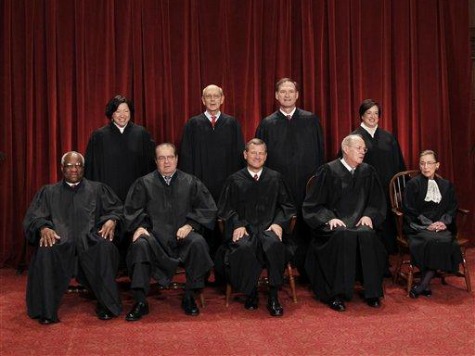
President Barack Obama’s lawyers are claiming vast and sweeping powers in arguments to the U.S. Supreme Court, according to Justice Samuel Alito in an address to the Federalist Society last week.
Celebrating its 30th anniversary as America’s premiere conservative and libertarian debate organization, the Federalist Society held its National Lawyers Convention on Nov. 15, 16, and 17 in Washington, D.C. Alito headlined the gala dinner at the Marriot Wardman Park, his third such appearance filling an annual speaking spot that in recent years has also been filled by Justices Antonin Scalia and Clarence Thomas, and even President George W. Bush.
Alito regaled the crowd with tales of how his constitutional law professor at Yale in the 1970s drank wine during class and became a devotee of the counterculture, abandoning the students before final exams to move to San Francisco. It’s little-known outside of elite D.C. legal circles that Alito is quite funny, and discusses significant issues with a style that leaves the audience rolling in laughter.
But it was no laughing matter when Alito turned to discussing the arguments that Obama’s U.S. solicitors general–first Elena Kagan (who of course now sits immediately next to Alito on the bench, fittingly to his left) and now Donald Verrilli–or their deputies have made to the High Court during this presidency.
Some of these were disposed of by the Court unanimously.
For example, Obama’s lawyers argued that the federal government has the power to order a Lutheran church to reinstate a minister the church had fired for suing the church in violation of church doctrine. All nine justices held in Hosanna Tabor v. EEOC that there is a ministerial exception in the First Amendment that exempts churches and synagogues from federal employment laws when it comes to hiring or firing spiritual leaders over religious teachings or practices.
Obama’s Environmental Protection Agency (EPA) told Michael and Chantell Sackett that their landlocked wooded lot was somehow a federal wetland, and that the Sacketts had to abandon their plans to build their dream home and pay more than the land was worth to restore it to their original condition, or suffer fines of up to $75,000 per day. (That’s not a typo.) The Court unanimously rejected the EPA’s argument in Sackett v. EPA that landowners had no right to take this matter to Court, where at least the Sacketts have a chance to persuade a judge to protect them.
When the Obama administration argued that federal agents can attach a GPS tracker to your car and track all your movements for the rest of your life, the Court in U.S. v. Jones held 9-0 that such Big Brother tracking would violate the Fourth Amendment unless a court first issued a search warrant or there are special circumstances.
Other cases, however, were won by a single vote. The best example is Citizens United v. FEC, where the Court by a 5-4 vote held that it violates the First Amendment for the government to imprison people for combining their money in a corporate form to engage in political speech before an election. Alito noted that all the major television networks and newspapers are corporations. The way the McCain-Feingold law was written, even media corporations could be prosecuted. And the administration had argued earlier in this case that the government even had power to ban books if they mention a politician, a suggestion most Americans would find astounding.
As Alito reassured the crowd Friday night, the nation described by all these Obama administration arguments is not the nation contemplated by the U.S. Constitution. And we can all be thankful that the Supreme Court agrees, even when only by a single vote.
Breitbart News legal contributor Ken Klukowski is on faculty at Liberty University School of Law.

COMMENTS
Please let us know if you're having issues with commenting.